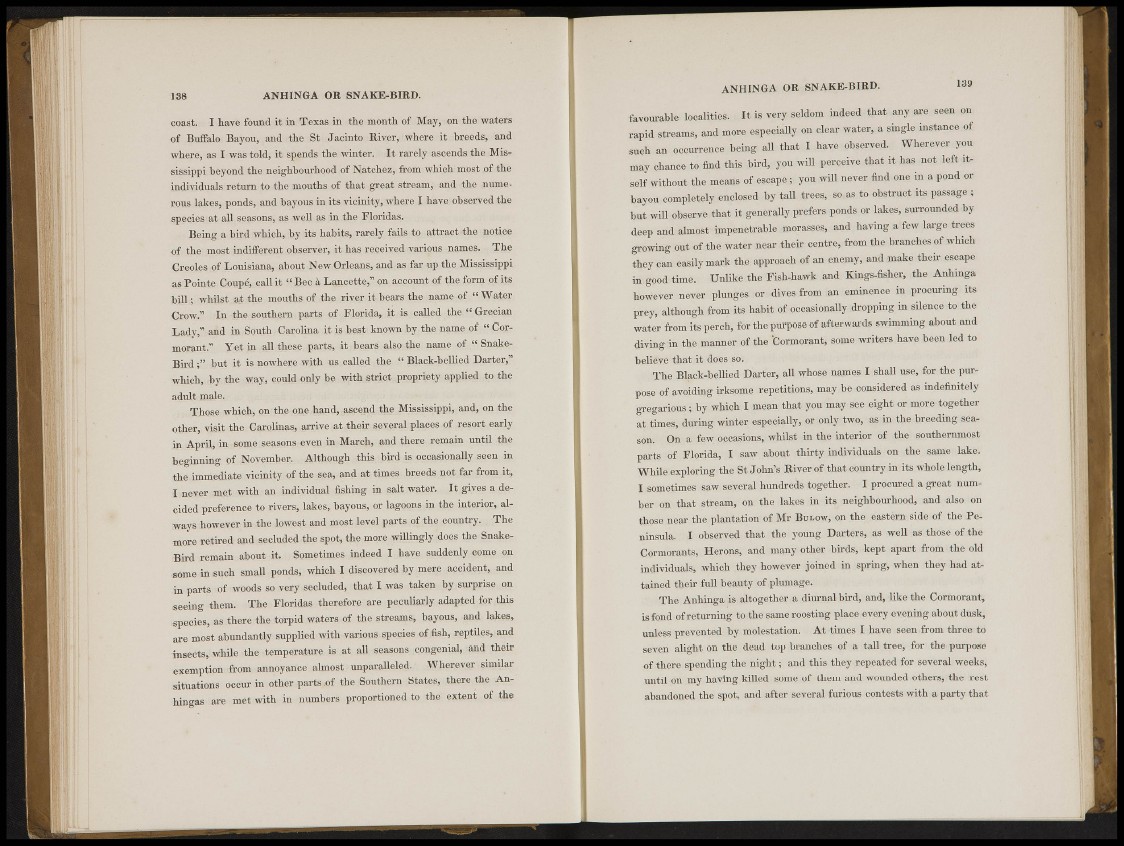
138 ANHINGA OB SNAKE-BIRD.
coast. I have found it in Texas, » the month of May, on the waters
of Buffalo Bayou, and the St Jacinto River, where it breeds, and
where, as I was told, it: spends the; winter. It rarely ascends the .Mississippi
beyond the neighbourhood of Natchez, from which most of the
individuals return to the mouths of that great stream, and the numerous
lakes, ponds, and bayous in its vicinity, where I have: observed the
species at all seasons, as well as in the Ploriilas. ,
Being a bird which, by its habits, rarely fails to attract the notice
of the most indifferent observer, it has received various names. The
Creoles, of Louisiana, about New Orleans, and as far up the Mississippi
as Poiffite Coupe, call it " Bee 4 Lapcette," on account of the form of its
bill; whilst at the months of the river it bears the uamo of "Water
'Grow," In the southern parts of Florida, it is called the " Grecian
I.ady," and in South Carolina it is best known by the name of " Cormorant."
Yet in all these parts, it bears also the name ¡.o^,' Snake-
Bird;" but it is; nowhere with -<uS called the " Black-bellied Darter,"
which, iy- the way, coukl only be strict propriety applied to the
adult male.
Those which, on the one hand, -^cond-theJMississippi, and, on the
-Other, visit the Carolina*, arrive at,their several places of resort early
in April, in-some seasons-even in March, and there remain until the
beginning of November. Although this bird is occasionally seen in
the immediate vicinity of the sea, and at times, breeds not far from it,
I n e w met with an individual fishing in salt water. It gives a decided
preference to rivers, lakes, bayous, or lagoons in the interior, always
howler in the lowest and most level parts of tho country. .. The
-more retired and^ecluded the spot, the more willingly does the Snake-
Bird remain abort it. Sometimes, indeed I have suddenly come on
some in such small ponds, which 1 discovered by more accident, and
in parts of woods so very-secluded, that X was take» by surprise on
seeing them. The Florida» therefore are peculiarly adapted ibr this
species, as there tho lorpid waters of the streams, bayous, and lakes,
are most abundantly supplied with various species of fish, reptiles, and
insects, while the temperature is at all seasons congenial, and their
exemption from annoyance almost unparalleled.' Wherever similar
situations Occur in other pacts.«« the Southern .State,«, there the Anhingas
are met with in numbers proportioned to the extent of the
ANHINGA OR SNAKE-BIRD. 139
favourable localities. It is very seldom indeed-that any are seen on
rapid streams, and more espeeiijly on clear water, a single instance of
such an occurrence being all that I have observed. Wherever you
may chance to find this bird, you will perceive that it has not left itself
without the means of escape; you .wUl-never find one in a pond or
bayou completely enclosed-by tall « ^ j ^ f e obstruct i t s passage i
but will observe that it generally prefers ponds or lakes, surrounded by
deep and almost impenetrable morasses, and having a few largo trees
growing out of the water near their« centre, from the branches of which
they-can easily mark the approach of an enemy, and make their escape
in good time. Unlike the'Fish-hawk and Kings-fisher, the Anhinga
however never plunges or dives from an eminence in procuring its
prey, although from its habit of occasionally dropping in silence to the
water from its perch, forth.; purpose of afterwards swimming about and
diving in the manner of the "Cormorant, some writers have been led to
believe that it does so.
ThS Black-bellied Darter,vall whose names I shall use, for the pur-
Jose of avoiding irksome repetitions,- may be considered as indefinitely
gregarious.; l.v which I mean, that you may see eight or more together
at times, during winter especially, or only-two, as in the breeding season.
On a few occasions, whilst in the interior of the southernmost
parts of Florida, I saw about thirty individuals on the same lake.
While exploring the St John's River of that country in its whole length,
I sometimes saw several hundreds together. T procured a great number
on that stream, on the lakes in its neighbourhood, and -also on
those near the plantation of Mr Bulow, on the eastern side of the Peninsula,
I observed that the . young Darters, as well as those of the
Cormorants, Herons, and many other birds, kept apart from the old
individuals, which they however joined in spring, when they had attained
their full beauty of plumage.
The Anhinga is altogether a; diurnal bird, and, like the Cormorant,
is fond of returning to the same roosting place every evening about dusk,
unless prevented by molestation. At times I have seen,from three to
seven alight, on the dead top branches of a tall tree, for the purpose
of there spending the night; and this they repeated for several weeks,
until on my having killed some of them and wounded others, the rest
abandoned the spot, and after several furious contests with a party that